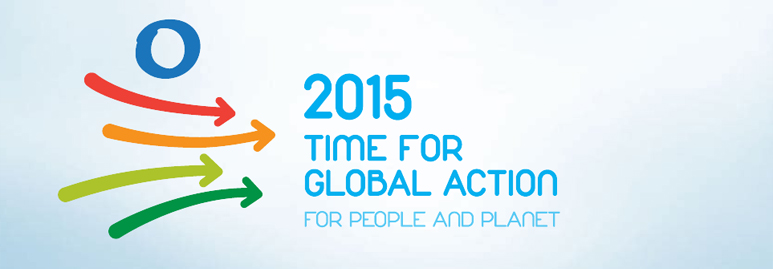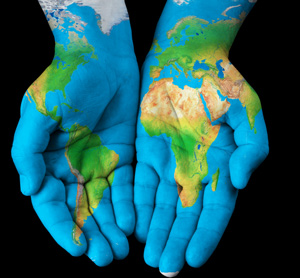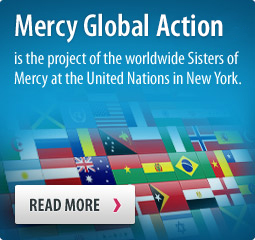
Mercy Worldwide Advocacy Contributes to Naming and Reaffirmation of the Human Right to Water and Sanitation
Reports: August 05, 2015
On Sunday, 2 August, United Nations Member States unanimously agreed on the final text that will be adopted by Heads of State at the UN Summit to adopt the Post 2015 Development Agenda in late September.

The Post- 2015 Development Agenda will shape official development policy for the next 15 years. The Agenda includes 17 Sustainable Development Goals (SDGs), including SDG 6 on universal access to water and sanitation.
The Mercy family worldwide celebrates the pledge made by Member States to 'A world where we reaffirm our commitments regarding the human right to safe drinking water and sanitation […]' in paragraph 7 of the final text.
We applaud the advocacy done by the global Mercy family on the vital importance of the recognition of the human right to water and sanitation in the sustainable development process, which is key for interpretation and implementation of the agenda. This untiring effort throughout the development of Sustainable Development Goals and the Post-2015 Intergovernmental Negotiations has had a considerable impact!
This recognition of the human right to water and sanitation in Post-2015 Development Agenda is the result of unrelenting efforts by Mercies and civil society groups over the past two and a half years during the Open Working Group and Intergovernmental negotiation processes, including a global petition signed by 621 organizations worldwide to name this human right in the document. This call was also carried forward by key Member States within the intergovernmental discussions.
The explicit naming of the human right to water and sanitation is critical to framing and interpreting Goal 6 on water and sanitation. Unless the text is rooted in a human rights-based framework, a water and sanitation goal would pave the way for greater commodification of water and sanitation services and freshwater supplies as the water scarcity crisis depends. Moreover, whereas the human right to water and sanitation is a fundamental and basic human right upon which many other rights are dependent, there are still major gaps and inequities in access.
In the face of the impending global freshwater crisis, this emphasis on the human right to water and sanitation in the Declaration of the Post-2015 Development Agenda is critical to call on States to prioritize universal enjoyment of public water and sanitation services. The realization of the human right to water and sanitation would be a concrete way for the world to pay what Pope Francis referred to in his Encyclical as “a grave social debt towards the poor who lack access to drinking water, because they are denied the right to a life consistent with their inalienable dignity.”
Throughout the final days of the Post-2015 intergovernmental negotiations at the UN in New York, Áine O’Connor rsm, Mercy Global Action Coordinator at the UN, and Avery Kelly, Mercy Global Action at the UN (Fellow), were present and actively advocating for the reaffirmation and naming of human right to water and sanitation with colleagues in the NGO Mining Working Group (MWG) and the Blue Planet Project. In our advocacy work, we engaged directly with Member States who have been with us in support of naming this human right in the Agenda since the beginning of this process, offering analysis and support. We also worked with broader civil society coalitions to develop and deliver a number of statements during the plenary sessions and in informal consultations with Member States leading up to the final marathon round of negotiations, before agreement on the final Agenda was reached.
It is alarming that in the final hours, there was a very real threat posed to the explicit reference to the human right to water and sanitation. In fact, the language proposed at that point would have resulted in a major step backwards in the recognition and the realization of the human right to water and sanitation. This retrogressive proposal required urgent and consistent advocacy until the final text was agreed.
 Our heartfelt thanks to Mercies worldwide for all of your advocacy efforts to ensure the naming and recognition of the human right to water and sanitation in the Rio+20 process, the Open Working Group on Sustainable Development Goals, and the Post-2015 Intergovernmental Negotiations process. Your advocacy letters and meetings with governments and UN Ambassadors and your special call on the Secretary General of the United Nations, Mr. Ban Ki-moon, to underscore the importance of the human right to water and sanitation in the Post-2015 Development Agenda, have paid off! This dedicated and persistent effort has truly made the difference! Let us celebrate our Mercy Global Action for the human right to water and sanitation!
Our heartfelt thanks to Mercies worldwide for all of your advocacy efforts to ensure the naming and recognition of the human right to water and sanitation in the Rio+20 process, the Open Working Group on Sustainable Development Goals, and the Post-2015 Intergovernmental Negotiations process. Your advocacy letters and meetings with governments and UN Ambassadors and your special call on the Secretary General of the United Nations, Mr. Ban Ki-moon, to underscore the importance of the human right to water and sanitation in the Post-2015 Development Agenda, have paid off! This dedicated and persistent effort has truly made the difference! Let us celebrate our Mercy Global Action for the human right to water and sanitation!
Mercy Global Action at the UN will continue to work with its colleagues the NGO Mining Working Group to ensure a rights-based implementation of Goal 6 on water and sanitation. We will also work to ensure that in the implementation of the Post-2015 Development Agenda essential services, including water and sanitation, are not privatized.
An analysis of the final text of the Post-2015 Development Agenda as it relates to our right-based advocacy efforts during the Post-2015 intergovernmental negotiations process will be prepared by Mercy Global Action at the UN in September.
Messages to:
Áine O’Connor rsm - Mercy Global Action Coordinator at the UN
Denise Boyle fmdm - Mercy Global Action
Avery Kelly - Fellow at MGA
Rita Parks rsm - Staff at MGA




